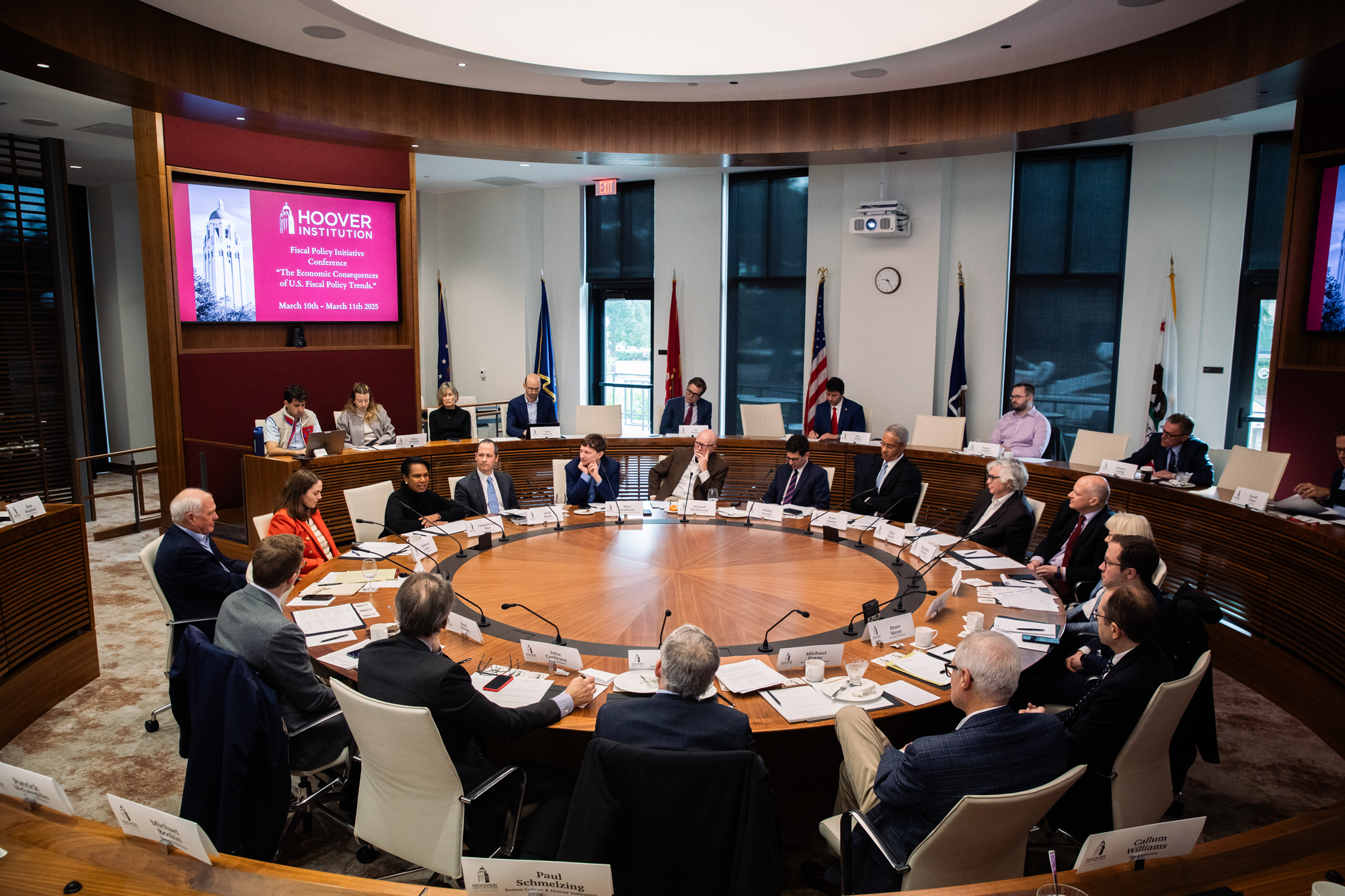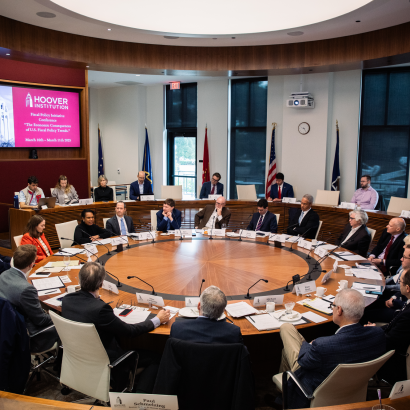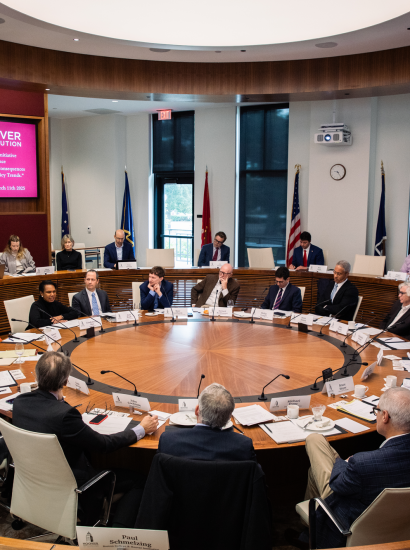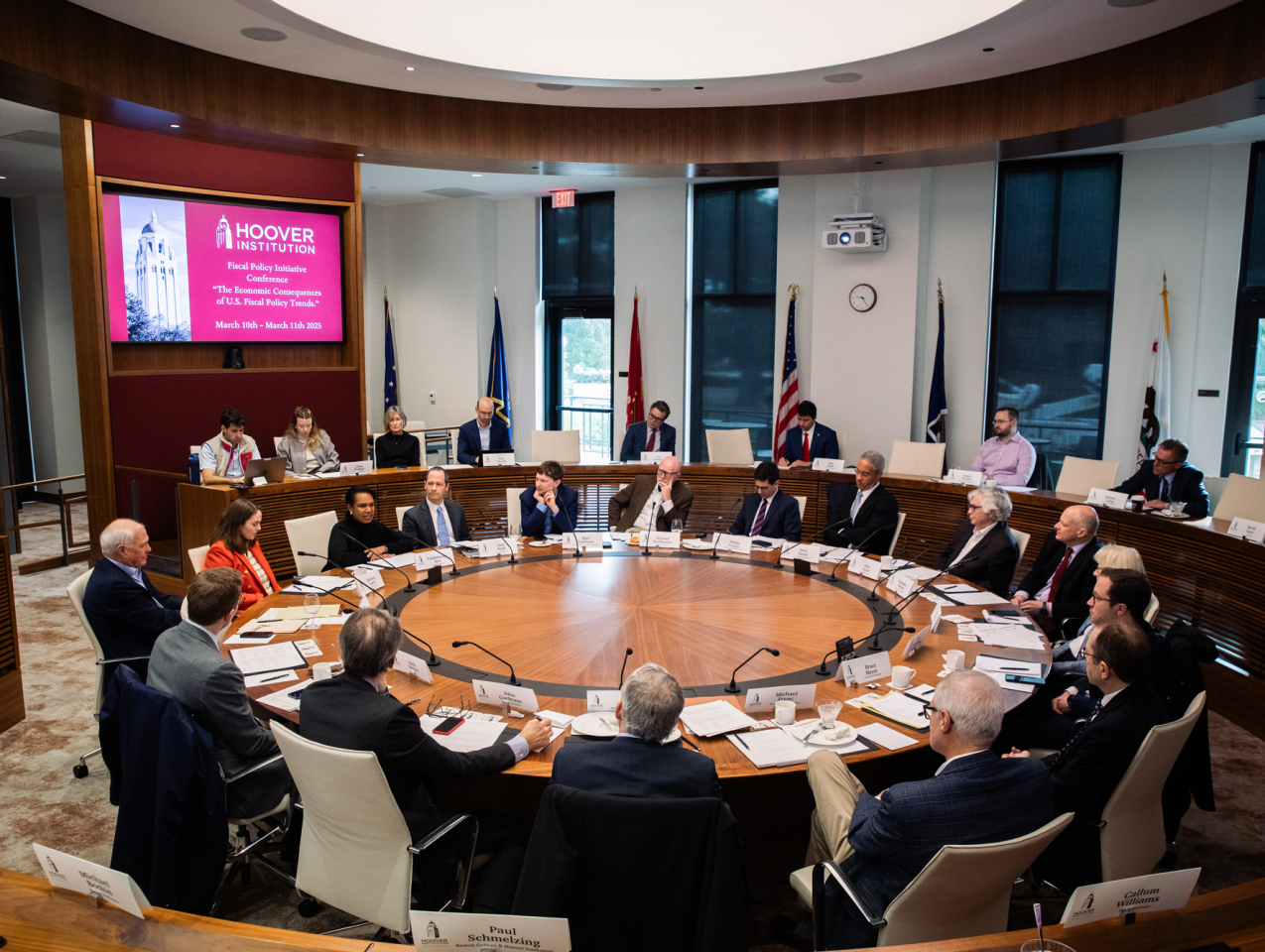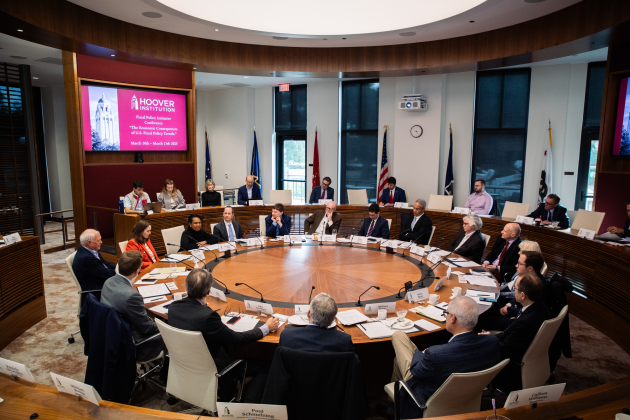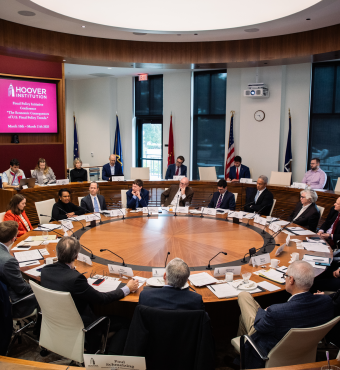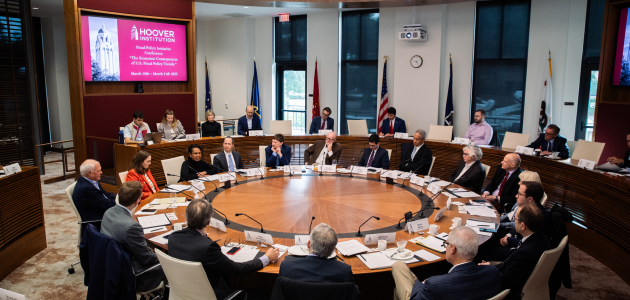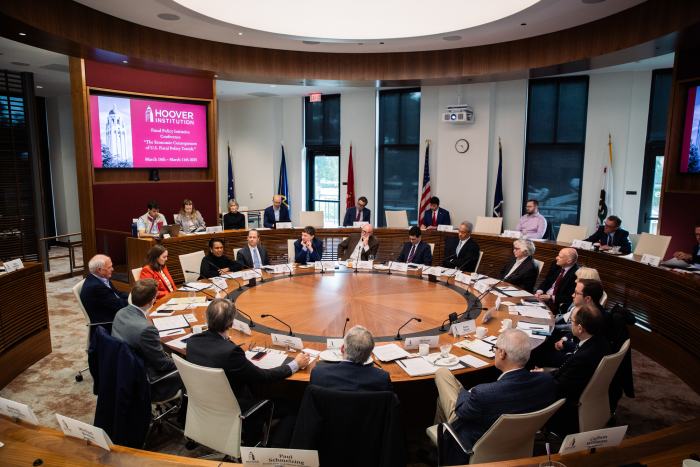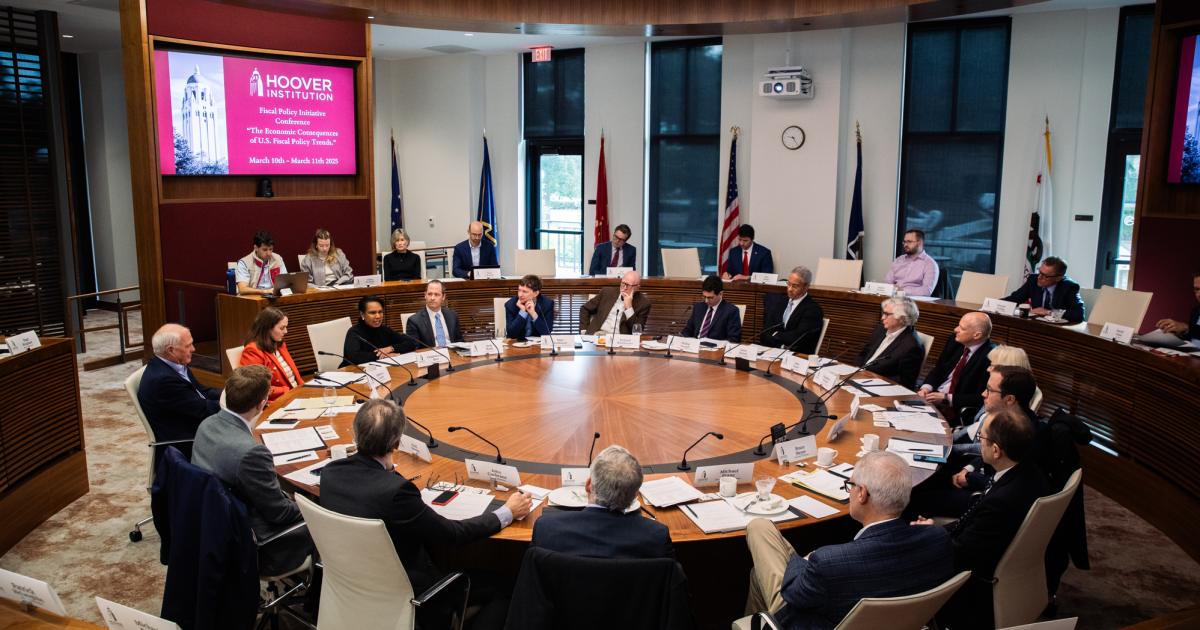In this edition of the Hoover Institution Briefing on Answering Challenges to Advanced Economies, Hoover experts examine how Washington is grappling with debates over taxes, spending, deregulation, and trade. In response, Hoover Institution scholars have been offering a wide range of insights and analyses on these and other challenges.
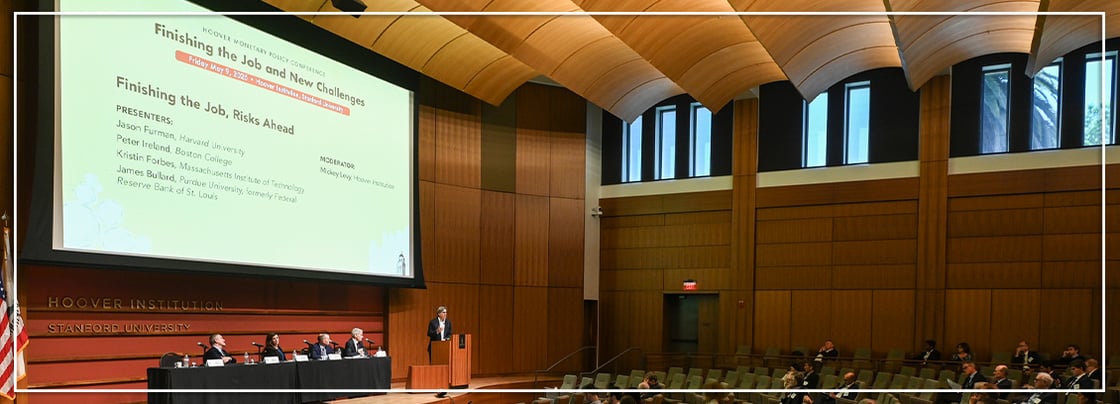
Hoover Fellows Continue Monetary Policy Leadership
With inflation still above the Federal Reserve’s target, the Hoover Institution remains at the forefront of monetary policy research. In May, Hoover hosted its annual Monetary Policy Conference, where fellows including Michael D. Bordo, Michael J. Boskin, John H. Cochrane, Darrell Duffie, John B. Taylor, and Kevin Warsh examined the future of monetary policy amid fiscal instability, questions about the Fed’s independence, and concerns over the Fed’s recent track record.
The conference was preceded by a celebration of Senior Fellow John Taylor’s decades of work on monetary policy and international finance. The event included a comprehensive review of the Taylor rule and highlighted Taylor’s many contributions at Stanford and in government. Remarks were delivered by Hoover Director Condoleezza Rice, Stanford President Jonathan Levin, several former Federal Reserve officials, and former students of Taylor.
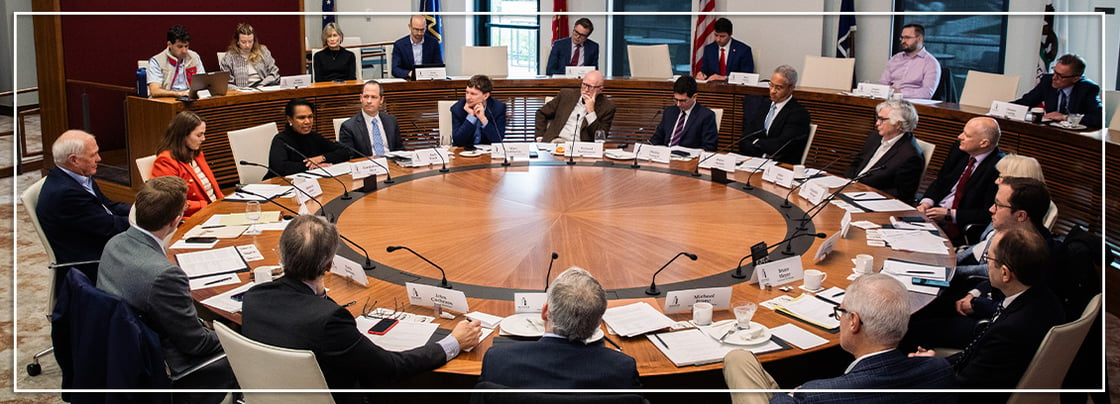
Taxes, Spending, and Borrowing
The Hoover Institution’s Fiscal Policy Initiative hosted its inaugural Fiscal Policy Conference, bringing together leading academics, policymakers, and journalists to examine the dangers of unchecked spending and borrowing. Highlights from the event were featured in a video addressing the most pressing fiscal issues facing the nation.
In a recent paper for Hoover’s History Working Papers series, Senior Fellow Niall Ferguson warns of the consequences when rising federal interest costs begin to displace defense spending as a top budget priority. Drawing parallels to historical episodes of fiscal overreach by former global powers, Ferguson argues that the US is approaching a tipping point where escalating debt service costs may constrain its global influence.
In May, Senior Fellow Joshua D. Rauh testified before the House Budget Committee on the Fiscal State of the Nation for Fiscal Year 2025. His remarks focused on the mounting burden of interest payments, the importance of pro-growth tax policy, and the urgent need to reform entitlement programs. On his Substack, Rauh, along with Ben Jaros and Daniel Heil, examine the House’s May tax legislation. While they find that the bill includes growth-oriented provisions, they warn that it also contains costly new credits and distortionary phaseouts.
Finally, in a research paper released in March, Senior Fellow Valerie Ramey and coauthors add new findings to a long-tested question: whether stimulus spending by governments has a greater “multiplier” effect in the wider economy than government spending cuts. Contrary to the conclusions of several earlier papers that tackled this question, Ramey and her co-contributors find no asymmetry. “It shows that the GDP response to a spending increase is roughly proportional to the response to a spending decrease, contradicting earlier findings of asymmetric effects,” the authors write. Ramey and her coauthors say this finding will have significant implications for policymakers going forward, especially in a time of high deficits and debt.

Trade, Tariffs, and Gun Violence
In the April edition of the video podcast series Economics, Applied, Senior Fellow Steven J. Davis spoke with trade experts Chad Brown and Douglas Irwin about the Trump administration’s trade policies. The discussion explored the likely economic and geopolitical consequences of renewed tariffs.
In May, Davis recorded a two-part series for Economics, Applied with Jens Ludwig about what traditional narratives get wrong about gun violence. Their conversation focuses on practical, low-cost policy solutions that can reduce gun deaths without remaking American society. These solutions include pocket parks, predictive policing, and programs that help people think about regulating their own behavior in stressful situations before they escalate to gun violence. Ludwig’s pocket parks idea sees vacant lots and other areas being redeveloped into small parklets in each neighborhood of a city. The thinking is that enabling more people to have a place to be outside and out of their homes reduces stress and friction that can lead to conflict, bringing gun violence down.
In his blog post “Tariffs, Saving, and Investment,” Senior Fellow John Cochrane explains that trade deficits stem primarily from an imbalance between domestic saving and investment. He argues that the problem is not capital inflows themselves, but that the US often uses them to finance consumption rather than productive investment. Tariffs, he contends, are a misguided response that fails to address these underlying fiscal and macroeconomic problems. Instead of treating the symptoms, Cochrane argues, the US must “cure the disease” by fixing the tax system and addressing the regulatory barriers that discourage investment.
Echoing Cochrane, Joshua Rauh in his own post disputes the idea—popular among some tariff advocates—that the US budget deficit is caused by the trade deficit. Rauh compares the claim to “discovering that you’re heavily in debt and then blaming the credit card company for having offered you a low introductory rate.”

Fixing Financial Regulations
In the Wall Street Journal, John Cochrane and Senior Fellow Amit Seru argue that the government’s failure to reform the housing finance system could trigger another crisis. They point to the role of Fannie Mae and Freddie Mac in distorting mortgage markets and warn that continued federal guarantees are fueling systemic risk.
In Barron’s, Seru and Senior Fellow Ross Levine argued in April that Congress should rise up to protect Federal Reserve Chair Jerome Powell from outside interference. They said the economic consequences of allowing a president to fire the chair of the Fed “are immense,” and could threaten the global dominance of the dollar and impair future US economic growth.
In a new Hoover PolicyEd video, Levine explains why banking reform should emphasize market discipline over additional regulation. He argues that the expectation of government bailouts encourages excessive risk-taking. To restore credibility and limit moral hazard, reforms must enhance accountability and demonstrate that regulators are prepared to let firms bear the consequences of their choices.

Healthcare Policy
The Inflation Reduction Act of 2022 included new measures to control Medicare prescription drug prices. In an essay for Hoover’s Healthcare Policy Working Group series, 2025 and Beyond: Healthcare Challenges on the Agenda, fellows John F. Cogan, Daniel Heil, and Casey B. Mulligan find that the price controls will lead to higher launch prices, reducing expected savings to the government and its enrollees. While the savings are smaller than lawmakers anticipate, the effects on innovation and future drug development are large.
In another contribution to the 2025 and Beyond essay series, fellows Lanhee J. Chen, Tom Church, and Heil explore reforms to the Affordable Care Act (ACA) that would expand access to health savings accounts (HSAs) for Americans with individual coverage. They argue that the decline in HSA-eligible ACA plans can be reversed with a minor legislative fix at minimal cost to the federal government. In a recent update, Church and Heil note that the House of Representatives addressed the issue in its May budget bill.
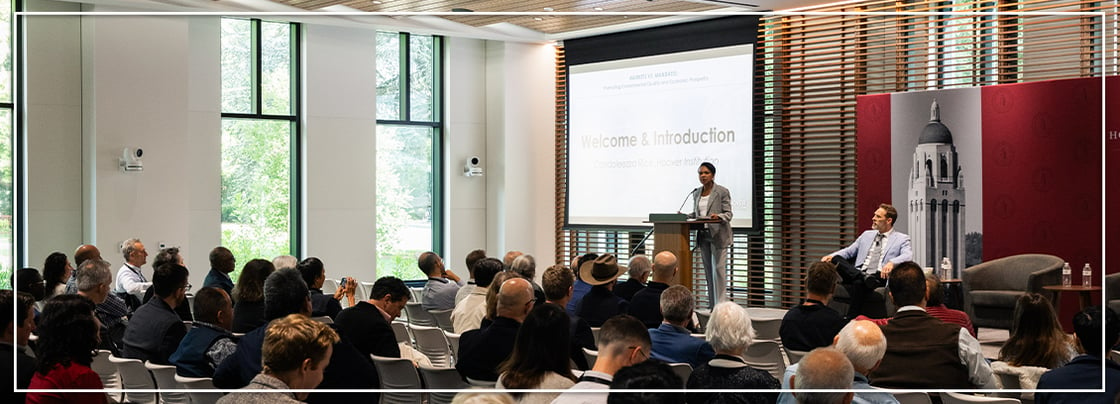
Markets vs. Mandates
Experts on energy and environmental policy, journalists, advocates, and Native American tribal leaders gathered at the Hoover Institution on May 13 to consider how environmental policies based more on markets than on government mandates can drive natural resource conservation and responsible economic growth. Attendees heard various views on how to pivot away from carbon-emitting energy sources and how markets can be unleashed to preserve the natural realm, as well as arguments that Uncle Sam needs to do a better job generating economic returns from its vast portfolio of federal lands. The Markets vs. Mandates research program at Hoover is directed by Senior Fellows Terry L. Anderson and Dominic Parker.
Read more here.

Spotlight: The Fiscal Policy Initiative
In April, Hoover launched its Fiscal Policy Initiative to confront the nation’s long-term fiscal challenges. Chaired by Josh Rauh, the initiative aims to identify the risks of, and offer solutions to, unsustainable fiscal policies, laying out a road map for restoring budget discipline and promoting broad-based economic opportunity.
For more insight on important economic issues visit www.hoover.org/focus-areas/answering-challenges-advanced-economies







